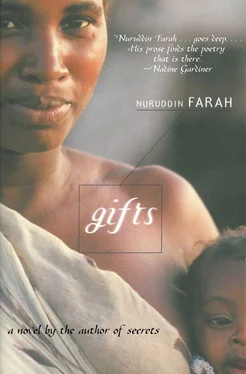Nuruddin Farah - Gifts
Здесь есть возможность читать онлайн «Nuruddin Farah - Gifts» весь текст электронной книги совершенно бесплатно (целиком полную версию без сокращений). В некоторых случаях можно слушать аудио, скачать через торрент в формате fb2 и присутствует краткое содержание. Год выпуска: 2011, Издательство: Arcade Publishing, Жанр: Современная проза, на английском языке. Описание произведения, (предисловие) а так же отзывы посетителей доступны на портале библиотеки ЛибКат.
- Название:Gifts
- Автор:
- Издательство:Arcade Publishing
- Жанр:
- Год:2011
- ISBN:нет данных
- Рейтинг книги:3 / 5. Голосов: 1
-
Избранное:Добавить в избранное
- Отзывы:
-
Ваша оценка:
- 60
- 1
- 2
- 3
- 4
- 5
Gifts: краткое содержание, описание и аннотация
Предлагаем к чтению аннотацию, описание, краткое содержание или предисловие (зависит от того, что написал сам автор книги «Gifts»). Если вы не нашли необходимую информацию о книге — напишите в комментариях, мы постараемся отыскать её.
Gifts — читать онлайн бесплатно полную книгу (весь текст) целиком
Ниже представлен текст книги, разбитый по страницам. Система сохранения места последней прочитанной страницы, позволяет с удобством читать онлайн бесплатно книгу «Gifts», без необходимости каждый раз заново искать на чём Вы остановились. Поставьте закладку, и сможете в любой момент перейти на страницу, на которой закончили чтение.
Интервал:
Закладка:
Last week the world ran and Africa starved. No doubt, television is a personality creator, and donors have their smiling pictures taken, alternating with scenes of Ethiopian skeletons. For the first time Africa has been given prime time TV” coverage, but alas, Africa is speechless, and hungry. In Conrad’s Heart of Darkness, the one and only moment the African is given a line to speak, the poor fellow is made to employ an incorrect grammatical structure. That was of prime and all-time literary significance. A hundred years later, in a film called Out of Africa, directed by an American, based on a book by a Danish woman who lived in Africa and maybe loved the part of the continent she lived in but had no love for its people, this film counted among its actors Somalia’s most famous daughter, Iman. Guess what: she has a non-speaking role. Make of all this what you will; but ask yourself, now what? Who gets what, gives what to whom?
I retreat into a skeletal silence: when the world runs and starving Africa starves; when the cameras click and runners catch their breaths, having chested the finish ribbons of a momentary glory. And when the TV-watching public and video-producing crews turn and ask me to say something, I feel shy, I am tongue-tied. Like a child to whom an adult has given a gift, who smiles timidly and takes it, and whose mother says, “Say thank you to Uncle,” I too say, thank you one, thank you all, Uncles Sam, Sung, and Al-Mohamed too.
She put aside the newspaper, delighted that Taariq could still have lucid moments of virtuosity. But why was the article published only now? Did the censors disallow publication when he submitted it, following the week in which the world ran while Africa starved?
Exhausted and yet unable to sleep, she contemplated the world surrounding her with a frown. And the world was a key. By staring at the key to the city flat, the one Fariida had brought from Miski, Duniya had the feeling she was looking at the levers, the carved bends and twists of her own future.
And suddenly, she knew what she was going to do. “Tomorrow evening,” she said, “Duniya will spend the night at Bosaaso’s to make of her body a gift to him. Tomorrow evening.”
IV. Duniya Gives
16
Duniya, in a mood of elation, calls at the city-centre flat where three cleaning women are busy preparing; it is in that exalted state of mind that she suggests she and Bosaaso spend the night at his place.
The scene opens in darkness, then a spotlight is directed on a woman standing in a river. As she readies to swim away, an unknown man is saying to her, “Gum to gum, dust to water, fire to earth, and you are in such a wonderful state of happiness where seven comes before eight, a cot before a baby, the bed before the ring.”
Her splashing arhythmic, the woman swims away, and the spotlight is switched off: end of dream sequence. Soon after a bulb is burning in Duniya’s and Nasiiba’s room.
Immediately after breakfast, Duniya, her children and Bosaaso went to the city flat — and they all liked it. She had arranged for three hospital cleaning women to perform a moonlighting job, to mop, dust, wash the floors and walls. Bosaaso ferried to and fro getting a plumber to fix the dripping taps and toilets that weren’t flushing properly, or a carpenter to repair the creaky garden door that wouldn’t shut, or pick up some US-made chemical with which to unblock the sinks and drains.
It was agreed that Abshir would use the city-centre flat, it being more central, more spacious. For his meals he would come to Duniya’s; alternatively Nasiiba would move in with him to help him cope, cook if need be. Duniya considered renting a car for the period he was in Mogadiscio, so he would be free to go as and when and where he pleased. Mataan was generous in giving up his spring bed, insisting that he didn’t mind sleeping on a mattress on the floor. Nasiiba offered to spend all day in the flat with the three cleaning women, doing as much as them, if not more, her hands and arms dirty to the elbow, her plaited, beaded hair brown with the webbed dust the spiders had spun. Although more of a hindrance than a help, little Yarey washed the midget sink in the kitchen, wasting precious detergent, time and water. Duniya vowed not to take a break until after she had prepared the bedroom, whose french windows overlooked the garden, certain that Abshir would prefer it to the other room facing a hallway. Meanwhile, Bosaaso hired a pick-up truck to bring from Duniya’s place Mataan’s spring bed, a couple of chairs, tables. A little later, Duniya sent him on a simpler errand: to have the new flat’s keys cut.
“Will you be able to stay overnight if need be?” Duniya asked one of the three cleaning women.
“Sure.”
“And no one will worry about you not returning home?”
The second woman said, “When you are our age, Duniya, you’ll discover what it means not to be missed. In any case I live within walking distance from here and can help organize food and mats for my colleagues too.”
“I’ll sleep anywhere, even on the bare floor,” said the third cleaner.
Having put in nine hours’ labour, Duniya and her entourage returned to her old flat, leaving the new one in the trusted hands of the cleaning women. It was late in the afternoon: tea was made and drunk, and Duniya showered, changed into a house garment and rested. Bosaaso went home to shower, then returned to Duniya’s as agreed. He met her, nervous, anxious, but also light-hearted as though his adulthood had provisionally given way to a younger self, brightly glowing in the happy atmosphere their eagerness had brought forth.
When the children’s backs were turned the two of them slipped away noiselessly, like naughty adolescents. She had the car keys in her hand and was saying, “I’ll drive.”
The nine-day-old moon led her towards Bosaaso’s house.
The sky was starry and spacious. The car stalled now and then, but this disturbed neither of them, producing only laughter. Doggedly, Duniya restarted the engine whenever the car stopped, both behaving as if they had all the time in the world to cover the distance separating their respective houses.
But wouldn’t she be missed? he wondered. Or had she told Nasiiba where she would spend the night? But the twins were so excited at the prospect of Uncle Abshir’s visit they might not give their mother’s absence a moment’s thought, he reasoned.
Now Duniya’s feet operated the clutch, brake and accelerator and the car ran smoothly, albeit anxiously, towards Bosaaso’s house, as if relying totally on its homing instinct. Duniya’s eyes grinned with the joy of anticipation. Bosaaso sat back, envying her calm. He kept his hands to himself; she wouldn’t have liked it if he had touched her while she was driving, he knew that.
“I love you,” he said.
Nothing suggested that she had heard his proclamation.
He repeated the words to himself: and then they touched.
The roads were more or less empty of cars, and they were driving through a district in which power had been cut. People, because of this, came out of their houses, poured into the streets where the air was fresher and where there were cage terraces, turning the nuisance of the lack of electricity to their advantage, going for walks by moonlight, or standing, in groups, chatting. At one point, there was a small gathering of men and women engaged in an argument in the centre of a crossroads. With full headlights on, Duniya had come on them without slowing down, causing them to run helter skelter, cursing, speaking all manner of insults, one describing her as a mad woman.
“I’m sorry,” she said, when in a state of mind to speak.
Читать дальшеИнтервал:
Закладка:
Похожие книги на «Gifts»
Представляем Вашему вниманию похожие книги на «Gifts» списком для выбора. Мы отобрали схожую по названию и смыслу литературу в надежде предоставить читателям больше вариантов отыскать новые, интересные, ещё непрочитанные произведения.
Обсуждение, отзывы о книге «Gifts» и просто собственные мнения читателей. Оставьте ваши комментарии, напишите, что Вы думаете о произведении, его смысле или главных героях. Укажите что конкретно понравилось, а что нет, и почему Вы так считаете.











